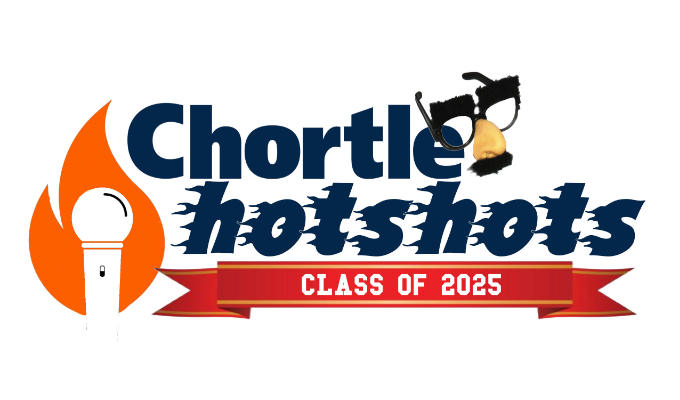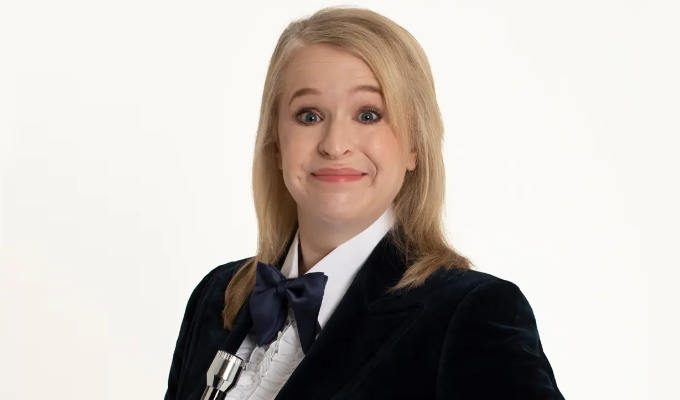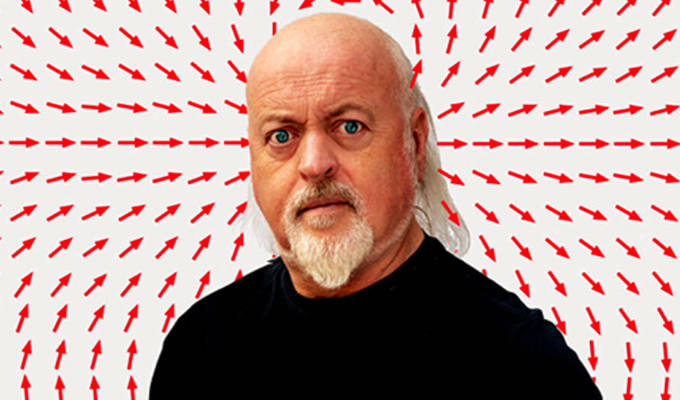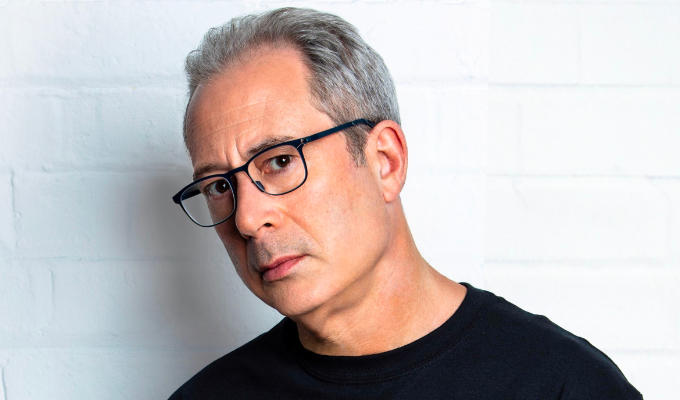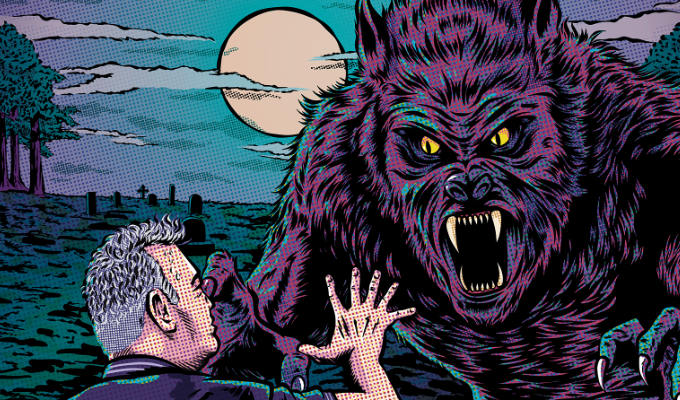
Take the wig and teeth off? That's what everyone would do... not me!
John Kearns on straddling the cult and the mainstream
John Kearns has joined forces with fellow Edinburgh Comedy Award winner Adam Riches to play mainstream musical double act Michael Ball and Alfie Boe in a Christmas show now on at Soho Theatre in London. Here JAY RICHARDSON talks to the former Houses of Parliament tour guide who sports a monk's tonsured wig and buck teeth when performing stand-up. Kearns remains the only comedian to win both Edinburgh's best newcomer award, in 2013, and the main award, which he took home the following year. He boosted his profile when he appeared on Taskmaster in 2022.
So, Ball & Boe. What can you tell me?
Usually, you preview. You try out gags. You start a show knowing something works. But this was a real swing in the dark. Happy to report that it seems to be going down well though.
People keep asking, ‘Well, what the fuck is it then? Are you impersonating them? Is it a joke that you're not them at all? Do you sing? I doubt you sing. Are you just singing carols?’ It's been interesting opening a show where we don't know how it's going to go. The audience don't know, certainly. But from 10 seconds in, they'll know.
We've been playing with the ambiguity. Adam is known for big, character comedy. I'm usually on stage in a wig and false teeth. But the poster, it's just us. After all the stupid character stuff that we've done, our true honesty on stage seems to be performing as Michael Ball and Alfie Boe.
Together, they're a part of the British psyche that no one really knew exists. I'm not comparing them to Brexit. But if you live in London, you're like, how did this happen? Ball and Boe, another No1 album? I don't know anyone who sees them or buys their music.
They're almost like archetypes. You can bring anything to them and project anything on to them. We're playing them. But we're not getting our Michael Sheen on. We're using them as a jumping-off point.
So you're not appearing in your usual wig and teeth?
No. And it's not a play. It's a story about originality and working in a partnership. They're incredible singers, no doubt about that. Adam and I saw them in 2020, a week before lockdown. Phenomenal. Alfie Boe is an incredible tenor and Ball has won two Oliviers.
But they're marketed like Morecambe and Wise. They're on the radio and Loose Women as cheeky chappies, billed as a comedy double act that can also sing.
Clive Anderson was in yesterday. We were talking about how he interviewed Peter Cook, with Cook playing all these characters. How Dame Edna would go on Parkinson. Or Steve Coogan would be on Jonathan Ross doing characters. Acts like Steve Martin or Tommy Cooper coming onto chatshows and doing physical stuff, Robin Williams, that's all gone. Lee Evans was maybe the last?
Now it's podcasts, people want to dig into your psyche and know your darkest secrets. When Nick Mohammed came on at the Baftas as Mr Swallow, I thought good on him, harking back to that.
So you and Adam are trying to wrest double acts, and even light entertainment, back to comedians?
Well, it was triggered by us separately watching [Money Saving Expert] Martin Lewis in 2016. The show was live and his set was a castle! We were texting each other, going 'imagine getting this budget for a comedy show!' Comedy has to be secondary to some other skill now, you're not trusted to be funny for funny's sake.
Ball and Boe, these Olivier-winning singers are funny. Martin Lewis can tell you what to do with your ISA and he's pretty funny, he started out doing stand-up. But comedy is never at the forefront, commissioners aren't taking that risk. Can these boys or girls sing? That's our money's worth. The comedy? Who cares?
I remember talking to both of you about it on Twitter many years ago, Adam calling it 'a joke that got out of hand' even then …
Ryan Taylor who books the Pleasance sent me a screen-grabbed text from 2017 saying 'do you want to do Ball & Boe in the Queen Dome [at the Edinburgh Fringe]?'
What I've learned and I think I can speak for Adam here, is that it's not rocket science. With comedy, you can obviously go up your arse. Especially if you're churning out a show every year. You can start being so woolly in your description of shows and what you're trying to achieve. And if you're not living a life, if you're not Richard Pryor setting yourself on fire or John Mulaney with his coke addiction, what are you talking about?
This, the poster is just me and him sat there in suits. Because you can overthink these things. America is better at this kind of silly, character-driven, unapologetic stupid stuff, with Natalie Palamides at the forefront …
More daring?
Daring in simplicity. We have a slight safety net of the audience thinking it's a Christmas show. But we've actually put a lot of work into it. Maybe that's what surprised the audience last night and will hopefully do so again over the next few weeks.
You've worked a lot with Pat Cahill and Jon Brittain, you've been part of The Weirdos comedy collective and The Bearpit Podcast Podcast. What do you enjoy about collaboration and how do you find being in a double act?
It's about compromise. [Lasties], that Radio 4 show I did with Tim Key, we wrote two episodes each, passed them to each other, added jokes and that was it. This has been quite intimate and different. We're learning to work with each other. And at times, that hasn't been easy. One particular joke that we added yesterday, I didn't think was going to land. But it got such a big laugh. Adam took a sip of water and mouthed 'I told you'. I didn't step on it. I let it roll, let him have it.
When you write with someone, you've got to be a fan of their work. When I work with Jon or Pat or Tim, they're good friends too. You've got to know them because you have to be able to disagree agreeably. If you don't know someone, you're going to have the drawbridge up a little. It's worked pretty well with Adam. He's a big structure guy, a big joke guy. And I've learned from him. He's got his way of working. I've got mine. And Tom Parry, our director, he's a force of nature, he's licked us into shape.
It can get tricky. You can have arguments, people are huffing about. Then you remember you're playing Michael Ball or Alfie Boe for a few weeks. It's just such a stupid idea.
Obviously, stand-up is a solitary exercise. The guy who's helping us with the music, Joe Bunker, he's been phenomenal. What he loves about musicals is how collaborative they are. And what appeals, especially at Christmas, is working in a little band, that's rare in our life. As my career goes on, it'd be nice to carry on building such partnerships. Because although it can be hard, it's extremely rewarding.
Adam has a reputation for audience interaction and you hardly seem shy of it, why do you like it?
It's the thing that keeps you in the room. The audience makes each night different, not your material.
But audience participation-wise, we actually made quite big cuts [for this show]. We're not trying to reinvent ourselves but I'd like to think that if people come along and they're fans of what we do, they are seeing something new. Anyone put off from seeing an Adam Riches show because they're terrified of audience participation, you're safe! We're too busy learning lines!
You borrowed the title of your most recent stand-up show, The Varnishing Days, from the Royal Academy. But equally you seem to revere old-school, popular entertainers. You're not a snob about art and influences are you?
You can't escape what you laugh at when you're younger. Then, you discover the acts that are niche, you get excited about comics that most people have never heard of. I'd find a Sam Kinison album when I was 15 and be like yeah, listen to this guy.
But as my career has gone on, I'm intrigued as to how you can be mainstream. It's harder now, with how people absorb comedy. As a kid, Laurel and Hardy, early Buster Keaton, that'll make anyone laugh. Only Fools And Horses is a benchmark.
It's not hard to be niche, weird or absurd. But to make something that gets into the public consciousness and is a mainstream hit, that's really difficult. As I've got older, I've got more respect for old-school entertainers.
Norman Wisdom was insanely talented. Those song and dance people … [Bruce] Forsyth! Younger people now probably don't know who he is. Even for my generation, he was the old guy who did the gameshows and Strictly Come Dancing. Larry Grayson doing Royal Variety. I'm not a snob, certainly.
For this show, the hardest bits to write have been the bits where we've been Ball and Boe on stage. It's actually really hard to do their kind of patter, that's safe, warm, jovial, slight ribbing. I've got a newfound respect for whoever writes their ITV specials.
The skillset of the best old school entertainers is incredible. That said, some of them have committed terrible crimes.
All of your live shows seems to have this tension between your niche or mainstream appeal, of how you make a living.
Listening to some podcasts, it's like people have never had normal jobs. I was hardly down the mines but I had a normal job for five years before becoming a full-time stand-up. And as a self-employed comedian for the past 12 years, I'm constantly wrestling with finding ways to do what I want to do.
After Taskmaster, I wanted to carry on doing what I'm doing now but I imagine there were places where 90 per cent of the audience were watching me thinking this isn't the guy from that show. There's a real alchemy, a juggling act in making your way viable.
Andy Warhol said: 'Art is anything you can get away with'. As long as the audience trusts you, you can get away with it.
Beyond sitcoms like Top Coppers, why was Guessable the first thing you did as 'yourself' on television, without the teeth and wig?
The producer had been the producer on 8 Out of 10 Cats Does Countdown when I first did that. And it was lockdown, the Melbourne Comedy Festival had been cancelled, the end of my tour had been cancelled and obviously, Edinburgh didn't happen.
I'd been making 90 per cent of my income from live. So it was squeaky bum time.
But what lockdown did, and I think I was a beneficiary of this, was that it stopped producers looking for the new thing. They were like, who do we have? And this role was created. We did four series, 50 hours of television, with no audience and they needed this person in the corner.
And I'm probably part of the bearded weirdo group. They were never going to get Alex Horne. And they probably can't afford Joe Wilkinson. So they created this role for me where I explained the rules and did a bit of business.
The money was bad for the first series but it was definitely a ‘beggars can't be choosers’ moment and I was extremely grateful for it financially. Even though I've done sitcoms like Top Coppers, a bit of acting, the monk's wig and bad teeth, is the first thing producers and casting directors think of me. Guessable showed the powers that be that I'm not going to be insane if I'm booked for something like Taskmaster.
Yeah, but that first appearance on 8 Out of 10 Cats truly split viewers. Your persona can still be a challenging proposition. Even after Taskmaster, do you still meet resistance to your act?
You have to commit to what you do and believe in it. There are plenty of gigs where I'm like, ‘right, this isn't going how I wanted it to’. And telly isn't the be all and end all, there's podcasts, there's social media.
But specifically on Cats Does Countdown, for a character comedian you're given two slots of five minutes where you butt in on four comedians that the audience know and love, playing a funny game. Then the audience looks at you, they haven't got a fucking clue who you are. And you've got to be weird. Then it cuts back to four comics who could all probably sell out the Apollo and they're playing a game again. There's no rhythm. But it's important for me to do those shows.
I just did Live At The Apollo. It’s only my second appearance doing stand-up on telly and it came after my special aired on Sky. I ummed and ahhed about doing it. But I thought I had to. Because I'd like to think there's someone at home who goes 'oh, "that". I like "that"'.
'That' stands out maybe.
Now, that may be because people think it's utter shit. But I've been doing this 12 years and I'm good at it. I'm not for everyone but the people I am for, I know they like it. I wanted to have a good gig. And the gig was fine. I didn't roof it but I didn't die on my arse. Four thousand people staring at me like, 'hmm, he's made some choices this guy'.

But you know, they were respectful. There wasn't chuntering from sedentary positions. They laughed at all the bits they should have laughed at. It's important that a bloke in wig and teeth can do shows like that, even if it's come at a point when I don't really need it.
Did you make much of a show of putting the wig and teeth on?
No, I just walked out with the wig on.
But the first thing I said was, 'it's good to be back!' Because it's the Christmas special but we're recording 2pm on a Tuesday, it's October 2, and it could go either way. So they're all thinking, 'OK, we don't know who he is but he must have done it before'. Bought me a minute.
I deliberately did material from my first show and my third, when I should have done Apollo. Because I thought, 'I'm not as weird as you thought I was'. I deliberately did bits from when I won Best Newcomer and ended on stuff from my new show, a complete cocktail. You have to do 25 minutes and they only need eight. And they might have eight.
There was a bit of audience interaction with these lads in the front row that is definitely not making it in. Whatever. Springsteen played that stage. That's all I was thinking about.
With your act, I guess engaging the crowd is your only Plan B if it isn't landing. Do you take pride in sticking to your guns and trying to make it work?
I don't have a 20 minute set. Every gig I go ‘right, what am I doing?’ Saying that out loud now, I'm thinking why do you put yourself through it? But, you know, it's a live experience, so you have to be present in the room, you have to be with them. And if they ain't enjoying it, I can't just do five minutes and take the money. I have to absolutely grab it by the scruff of the neck and try to make it work. Sometimes, that makes it worse.
But when I walk off stage, I never think, 'fuck it'. I always come off thinking that I gave it everything. Warming up for Apollo, I was doing gigs I don't usually do. Tough gigs. I told the audience about the recording and one bloke shouted: 'You better call in sick!'
I often think of David Foster Wallace saying life is like water, how anything that's in front of you at the moment is going to flow over you and be behind. Whenever something's going bad, I just visualise that I'm in the sea or a pool.
Sometimes, that isn't brilliant. You're stood in front of 500 people and they're looking at you, wondering why you aren't saying anything funny. You're just there, eyes shut, imagining you're in a pool. But it helps. It helps.
With some qualification, you quote the likes of Woody Allen and Jerry Seinfeld in your live shows. You seem to respect the comedy pantheon and have a tongue-in-cheek idea of your place in it, taking delight in being a 'turn'. Why is it so important to you?
When you talk about people like Dame Edna or Lily Savage or, any comedian really, the key is consistency and longevity. It goes back to what I was saying about being in the moment and letting gigs wash over you.
It doesn't really matter how this week goes. It doesn't matter how the last six months or even this year goes. It's about the next ten years. If I've had a bad gig or a quiet year, I try to see the bigger picture.
You know this idea of becoming almost two-dimensional, like a comedian having an instantly recognisable silhouette? I'm not going to say that's important to me but I'm acutely aware of how success is defined by it. The more you do comedy, the more you become something. The edges are rounded off and you become more streamlined. People love going to Edinburgh or seeing comedy in basements, because you're getting the real grittiness. But over time, they're like, 'oh, you've got to take the wig and teeth off, all that'.
No. Because that's what everybody else would do. You've got to keep going. I think of Jacques Tati, of Chaplin, of silent movie stars and the silhouette. I always try to wear a white shirt, black trousers and black shoes. I try not to give away anything with my clothes… I like the blank canvas. Harry Hill and Steve Martin are similar. So I think about this stuff a lot. You trust your instincts. And then, in hindsight, you work out why you trust them.
You feature in Tim Key's poetry as his drinking buddy, The Colonel. And you obviously relish a lyrical turn of phrase. Might you write a book?
Adam and I were talking about this. You see a promising newcomer and the thing that pops is the writing. Stagecraft comes with practice but writing is key. When you're starting out, people tell you to gig, gig, gig. I don't believe that. Yeah, gig. But also have a life outside comedy. Fall in love, get drunk, have friends. Comedy should be something you do on the side. But write. Write every day.
When I had my job at Parliament, I'd have a pack of Post-It Notes and just write a few words, a phrase or an idea. By the end of the week or the month, I'd go through them. Is that a funny idea?
Peter Kay would put Talk Radio on and wait for phrases that made him laugh. Comedy is language and rhythm. Kevin Bridges has that perfect alchemy of language, rhythm, he understands his own intonations perfectly.
Regarding books, I guess I'm slightly intimidated. You read Richard Flanagan and you're like … well, obviously no one's comparing me to a Booker Prize winner. But you're in the same shop! I'm talking to you now, I'm 37, and I'm impersonating Alfie Boe. Writing a book is something I'd love to do. I want variety in my career. So if I had an idea, I would.
But at university, I lived with Pat Cahill and he had that Ronnie Barker book All I Ever Wrote. It's massive. Fuck me, that's writing. It's like Shakespeare. And The Only Fools and Horses scripts? Written by one bloke! I'm not using hyperbole here, I genuinely believe you could look at John Sullivan's scripts and understand the Eighties like you can read Dickens and understand the Victorian era.
Could you see yourself writing a sitcom then, perhaps a vehicle for your onstage portrayal of the common man with aspirations?
That is certainly something I want to do, I'd very much like to do a studio sitcom. There's a few things maybe happening. Television is changing, it's having to compete with things like Fin vs the Internet. I'm not saying I could do what Fin [Taylor] does but I want to do something on television that I couldn't do myself. Use television for what it was created for in the first place. And the studio sitcom was created for television. It can only be done on TV.
Rather than trying to compete with GoPros and iPhones, where you can just do it for yourself, let's use the trappings of a studio, get an audience in. The restrictions excite me, the challenge of being cornered by the rules of studio sitcom. Multi-cam feels old school but can I do something new with it?
I don't know if I'll be given the opportunity. I'm not talking about making water-cooler television because that doesn't exist anymore. But if you can crack a good comedy, old school in style, in 2025, that's exciting.
It's like that David Bowie quote about going a little further into the water than you feel capable of, when you don't feel your feet quite touching the bottom, that's where the real work is. Creating a sitcom without an audience feels safe. But a studio sitcom in 2025? That would be mad wouldn't it?
It feels like walking on … that Seamus Heaney line … 'you're walking in the air' .. no, fucking hell, that's The Snowman isn't it?
'Walk on air against your better judgement.' Trust the process. Trust what you've done on stage for 12 years. Obviously, a bigger thing is to get someone with money to trust it too. Picture me, walking into a channel and telling them that I trust myself to do it. 'Yeah, brilliant. But we don't trust you sadly'.
Still, that's the ambition. I think I'm at my best live and I haven't replicated that yet on screen. Doing Taskmaster, Cats Does Countdown, Guessable, Live at the Apollo, that's great. But to make your own world, a single, authored piece, I'd like to think that's in the future. At the moment though, I'm just trying to remember lyrics to The Greatest Show by Michael Ball and Alfie Boe.
I understand you mentally struggled a bit after winning the Edinburgh Comedy Awards. What happened?
You know, when I won the Newcomer Award, I quit my job and all of a sudden there was no structure in my life really. It was an exciting time, but also a bit like: 'What the hell do I do now?' Then I won the main award and I was on a merry-go-round, meeting the same producers I'd met the year before.
I did the two different shows at the Soho Theatre over eight weeks in 2014. In the middle of that was Melbourne, I'd left my job of five years, then the following January I did Top Coppers. It was just a whirlwind.
So really important for me, my first show after the awards, was my Christmas show that I did at the Battersea Arts Centre. I did it for Radio 4 too and I'm very proud of it. Because that was me getting back on the horse on my own terms. It was very personal. Only a week. But it was really helpful after all the chaos.
The Edinburgh Comedy Awards aren't what they were in the Nineties, they don't have that same cachet. But they're still a benchmark. And crucially, I won five grand.
I didn't have an agent. But I got a message on Facebook from the producer of House of Fools, the Vic and Bob sitcom. I went into the rehearsal, and it's just me in my work uniform, Vic, Bob, Morgana [Robinson], Matt Berry, Daniel Simonsen, Ellie White maybe, the director. And I had this one line. I didn't even get to do the show in the end, I don't know what happened.
But back at work, I thought what am I doing? I'm outside Parliament talking to Italian tourists and an hour ago, I was with Vic and Bob. I can't sustain this. So I quit my job. The awards allowed me to do that, so I'll always be grateful for Edinburgh.
So what's next?
I'm not joking when I say that this show is good. We've been looking at each other going 'bugger me!' It's only a two-week dickaround but we've created something that's maybe special. The problem is, it can't really go anywhere else. Because then, legally, it gets a bit tricky.
I'm working on a live show for next spring. You've got to book gigs a year in advance. Fucking bananas. Live is always the bread and butter, I bow down to live. It keeps me sane. Gigging, gigging, gigging. I know that contradicts what I said earlier but I want to clarify, when you're starting out, you should have other things in your life. Live life.
But now, I'm at a different point in my career. This is my job. No matter how things go on telly, how I'm interpreted, I can always prove myself standing on a stage. Everything else that comes in is exciting. I'll just enjoy the ride.
• Ball & Boe runs until January 4 at the Soho Theatre; Live at the Apollo Christmas special airs on December 17 on BBC Two and The Varnishing Days is still available to download at Sky Comedy.
Published: 13 Dec 2024

